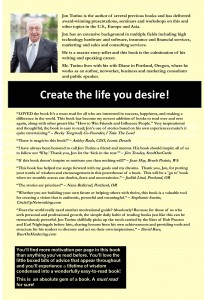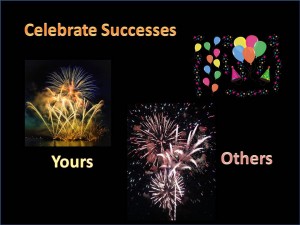Visualize & Plan – Chapter 2 Excerpted from Motivational Magic


Beginning the process of growth requires you to ask yourself a lot of questions. What is it that you’d like to accomplish in your life? What would you like to be doing as a career? How would you like to look? How would you like to be contributing to your own good, the good of your loved ones and the good of society? How do you want to be viewed by those who you care about? By those who you leave behind?
What is your fondest dream? How does it look when you visualize it? If you are not currently living it, and I can only assume that you are not or you wouldn’t be reading this book, how does it feel when you imagine that you are living it?

Regrettably, I can’t answer any of these questions for you. Only you can imagine how things should be, how you want them to be, how they will be once you’ve done what’s needed to make them happen.
What is your dream? How important is it to you? How willing are you to pursue it? What risks are you willing to take and what sacrifices are you willing to make to achieve your particular dream? Sometimes life is about risking everything for a dream that no one can see but you!
Change begins with a vision. A picture coupled with an emotion – how things feel when you’ve done what needs to be done to make reality as you experience it match reality as you have envisioned it. We’ll talk much more about the details of using the Visual Image Formation technique in Chapter 9, but the concept is essential to any and all changes that you’d like to make in your life.
If you can create a vision, and you most certainly have the power within you to do so, then you can constantly remind yourself of that image. You can use affirmations, notes on your bathroom mirror, schedule messages to pop up on your computer, tablet or smartphone. You can do whatever you need to do so that the vision remains in the forefront of your conscious mind so that it can be continuously transmitted to your subconscious mind.
Your subconscious mind – mainly the right brain hemisphere – is designed to keep reality as you experience it in harmony with reality as you envision it. In other words, if the reality as you’re currently experiencing it does not match the reality as you visualize it, then your subconscious mind will go to work to make you do the things you need to do to make reality as you experience it match reality as you envision it. Or it will change your vision. But more about that later.

Once you have successfully implanted your vision in your brain, you won’t be able to stop thinking about it. And if you can’t stop thinking about it you won’t be able to stop working on it – or for it. It’s a simple, but not necessarily easy, matter of putting your mind to work on making you do the things you need to do to make the vision a reality.
What will it make you do? Let us count just some of the ways:
- It may prompt you to get answers to questions you hadn’t thought of before;
- It may provide you with “aha” moments or answers – particularly after “sleeping on it;”
- It may cause you to be more aware of something or someone around you;
- It may encourage to gain new knowledge or new skills.
I have no clue exactly what will happen for you since I have no clue as to who you are, what you want, who you want to become or why you want the dreams you want. But you do! Or at least you can begin to find that out.
Identify what you want – creating a vision or mental picture as clearly and in as much detail as possible – enables you to plan to make that vision a reality. And it is in this planning phase where special care is needed.
Let’s say that you have a relatively short term dream of walking across the stage of a prestigious university in a cap and gown to receive your college degree. Visualize yourself doing that. Imagine, in great detail, how that will feel. Think about how much pride you will feel when that degree is hanging on your wall in your home, your study or your office. Imagine the things you can do now that you have your degree that you couldn’t do before.
Are you with me so far? And isn’t something else happening as you go through this exercise? What is it? Isn’t it your brain telling you that you can’t? That you don’t have the time, the intelligence, the money or something else to make this dream a reality?
This is where you really need to watch out. When you create a vision that is different than reality as you are currently experiencing it, then your subconscious mind will go to work to help you resolve the disharmony that is created when reality as you envision it doesn’t match reality as you experience it. So it will either help you do the things you need to do to make reality match your vision or it will change or corrupt your vision! But it will resolve the disharmony!
We all have the self-talker inside of us. It’s usually negative and left over from our earlier experiences as children or early in our careers. The “Well, I can’t because…” syndrome: I’m not good enough, I’m not handsome or pretty enough, I’m not smart enough, I’m not blah, blah, blah…”
When this happens, we need to recognize it and tell this inner voice to shut up! Tell that doubting voice that those excuses are in the past and are no longer inhibitors to new dreams and plans. Those were the bad old days and those were the bad old ways. You are good enough and, by golly, if you aren’t yet you soon will be! The strongest factor in achieving success is self-esteem: Believing you can do it, believing you deserve it and believing you will get it.
If you fall victim to this inner voice and begin to say to yourself “I can’t…,” then you will achieve nothing except the ability to say that you are always right. For if you say you can’t then you won’t and you should probably stop reading here.
Keep in mind as you visualize and begin the process of goal setting, strategy development and tactical implementation of your plans is that you’ll want to learn to develop a sense of urgency for achieving your goals. Life is short, and if there was ever a moment to follow your passion and do something that really matters to you, then the moment to get started on that passion is NOW!
Another thing that we’ll talk about further in future chapters is letting going of other kinds of baggage besides the self-doubter and the I-can’t-er. It is hard to keep a sharp focus on your vision of the future if your eye is stuck on the past or even sometimes on today.
This is not to say that the vision and the plan should become so all-consuming that we go overboard and ignore our day-to-day duties and responsibilities. Moderation in all things is the watchword.
We want to keep our vision in the forefront so that as we set goals, develop strategies and implement tactics we are making sure that each action we take contributes in some way, shape or form to the overall plan. We want to make sure that we make the rest of our lives, starting from this moment, the best of our lives.
I said in the beginning that there is magic in this book.There is also magic in believing – believing in what you want, what you visualize, what you need, what you desire or want and, most importantly, believing that you will get it!
####
Get your copy of Motivational Magic on Amazon.com or from Kindle at http://www.amazon.com/dp/B0112ODGD. Order or download your copy now.













